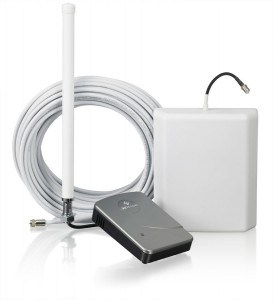
Signal boosters use an outdoor antenna to reach distant cell tower sites, while using an indoor antenna your mobile device can lock onto for improved reception.
If the Federal Communications Commission has its way, Americans annoyed with lousy cell phone reception will soon be able to purchase a new generation of signal boosters capable of delivering service to fringe reception areas ignored or bypassed by providers. And unlike home cell-phone extenders, they won’t use your home broadband connection while also eating up your voice and data allowance.
A signal booster, not to be confused with a “femtocell” some wireless carriers sell or give to customers, acts like an amplified super-antenna — giving a boost to phones and mobile broadband signals in difficult reception areas.
This devices have been around and legal to use for a several years in North America, much to the consternation of cell phone companies and some public safety officials who deal with occasional interference problems created by misused or malfunctioning equipment. The FCC is trying to find ways to mitigate interference problems while still allowing customers to benefit from signal boosters. There are documented cases of rescuers relying on the equipment in remote disaster areas, and rural residents have managed 911 calls that would have been impossible without signal boosting technology.
Despite the agency’s efforts, several cell phone companies — particularly AT&T, object to the Commission’s plans to allow the independent use of signal-boosting equipment on “their” frequencies and networks. Because cell phone boosters agnostically enhance every company’s signal within its frequency range and does not require users to pre-register phones to get access, AT&T stands to lose revenue if they are not the exclusive authority on selling, approving, and registering the use of miniature relay stations that boost their network’s coverage area.
AT&T currently sells customers femtocells which reduce dependence on the carrier’s overburdened 3G network — offloading traffic onto home and workplace wired broadband connections, which includes both voice calls and data. But only a small percentage of customers get the equipment for free, often extending their contracts in the process.
Some providers and emergency responders have documented instances where these devices have created interference problems for cell tower sites and for emergency radio traffic that co-exists on the same frequency bands signal boosters occupy. In some cases, inappropriate use of signal boosters has blocked emergency traffic, shut down cell sites, or reduced their coverage. That is why the FCC wants the next generation of signal boosters to be able to intelligently interact with cell sites and other traffic users and reduce their power or discontinue service if they begin to create interference problems.
AT&T’s suggested safeguards go well beyond what most other carriers want from the FCC:
First, AT&T proposes that wireless licensees have “ultimate control” over any signal boosters operating on their networks under a presumptive authorization. Specifically, signal booster operators must activate their devices with the licensee prior to initial use. In addition, the booster must possess technology to permit the licensee’s network to identify the device as a booster and identify its location at all times. Further, the licensee must have “dynamic control over the boosters’ transmit power” and have the authority and ability to turn off the booster for any reason at any time. Alternatively, AT&T proposes that the booster have “automatic gain control functionality that adjusts the power provided to the booster based on distance to the relevant base station.”
Second, AT&T proposes that signal boosters may only be operated on a channelized basis on the frequencies authorized for use by the wireless licensee whose signal is being boosted. AT&T suggests that manufacturers could meet this requirement by selling carrier-specific narrowband boosters or by designing “intelligent” boosters that limit transmissions to the spectrum licensed to the carrier whose signal is being boosted.
Third, AT&T proposes that signal boosters be designed with oscillation detection and will terminate transmission when oscillation occurs.
Fourth, AT&T proposes an expanded certification process for signal boosters that are to be used pursuant to a presumptive authorization. Specifically, the booster would be subject to (1) the Commission’s equipment certification process; (2) an industry-driven certification process;105 and (3) individual licensee approval to ensure compliance with the licensee’s proprietary confidential network protocols.
Fifth, AT&T proposes that any presumptive authorization standards be applied prospectively and that the Commission bring enforcement action against parties that sell, market, or use devices that do not meet the presumptive standard.
Equipment manufacturers are not impressed with AT&T’s ideas. One tells Stop the Cap! if adopted, signal boosting equipment would cost more than double today’s average price of $200-400.
“AT&T has built so many requirements into their proposal, they know the result will be a product too expensive to sell to consumers,” the source tells us. “And the part where AT&T wants the right to authorize and register the equipment gives them the option of charging a fee for doing so, turning the product into yet another way for AT&T to make money.”
Equipment manufacturers agree that there have been instances of interference problems, and they are willing to work with the Commission to find solutions, but not at the risk of adopting proposals some suspect are designed to destroy the signal booster business.
“AT&T is a control freak, plain and simple,” the source says. “If they don’t own it or control it, it’s offensive to them. It must be eliminated.”
More than one equipment manufacturer has noted, not for attribution, they find AT&T’s complaints a bit ironic.
“This is the same company that is already notorious for dropping calls,” said the source. “You would think they would look favorably on anything that could deliver ‘more bars in more places,’ because AT&T sure isn’t doing it these days. Just ask their customers.”


 Subscribe
Subscribe

Remember Carterfone and the PCA?